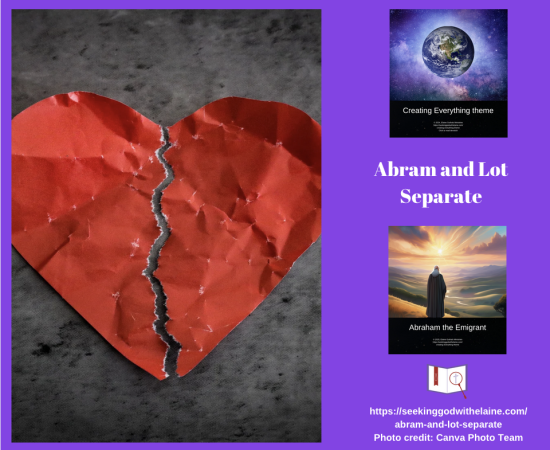Abram and Lot both had large herds that were vying for limited resources. This devotional reading looks at how uncle and nephew separated to restore peace in the family.
Nuggets
- Abram and Lot both being wealthy caused problems.
- Abram imitated the graciousness of God.
- Lot chose wrong.

Right when we think things are looking up, they go off the rails. Trouble in the family is a frequent reason.
We said that Lot provided some of the troubles for Abram. This is one example.
Let's Put It into Context
To read devotions in the Creating Everything theme, click the button below.
Devotions in the Abraham the Emigrant series
Disputes
“But the land could not support both Abram and Lot with all their flocks and herds living so close together. So disputes broke out between the herdsmen of Abram and Lot. (At that time Canaanites and Perizzites were also living in the land.)” (Gen. 6-7 NLT)
Disputes
Abram and Lot both being wealthy caused problems.
Some would say that Abram and Lot had a good problem. They were both prospering.
We talked in the last devotion that we haven’t heard much about Lot. We just know he was Abram’s nephew and traveled with them from Ur to Canaan.
The Essex Remembrancer called Lot a good man. He may have been when he left Ur. He would have had a good example in Abram.
Resource
Maybe Lot had started out from Ur following God’s call. Like salvation, our initial acceptance of God at conversion is only the beginning. We must then walk with God daily as we are sanctified.
We just talked about the impact the wealth and opulence of Egypt had on Lot. Being dazzled by the country may have turned him away from God if he had called upon God previously.
Pearse described Lot’s religion as being second-hand. It was Abram’s religion and only rubbed off on Lot because of association with Abram, not with God.
Resource
It appears that Abram was looking at the distant future — “I’ll give this land to you and your descendants.” Lot was focused on the here and then.
Lot’s problem, we will find, is that he was amassing a worldly prosperity. His ambition did not seem to lead to growing a closer relationship with God.
We can’t get to God by hanging onto someone else’s coattails.
We’ve talked a couple of times about the altars that Abram built. Yeah, Abram. Not Abram and Lot.
In the last devotion, we talked about the altars being a gathering place as well as a place of worship. We aren’t told that Lot gathered.
Regardless of Lot’s relationship with Abram and God, the herdsmen were fighting.
True, the herdsmen could be seen as doing their jobs — providing for and protecting their herd. They were surely frustrated that there was not enough resources for both.
Why was resources so limited? Remember, Abram didn’t own the land. Neither did Lot.
The Canaanites and Perizzites did. That would have limited the land to which Abram and Lot had access.
The herdsmen were probably taking cues from their employers.
Adamson had some great words to describe the disputes between the herdsmen: “unseemly, untimely, and unnecessary.”
Resource
We can’t really tell from verse 7 how far the disputes had progressed. Maybe the herdsman had gone to either Abram or Lot and discussed the problem. Maybe they didn’t until the matter got out of hand.
However far it had progressed, the dispute doesn’t seem to have alienated Abram and Lot. They did come to a solution between themselves.
But I don’t see Abram letting it get too bad. He knew that being family carries obligations with it. They should work through issues that arise between them.
Major problems in families can lead to hurt feelings, anger, bitter dissension, and separation. God doesn’t want us to go there.
Canaanites (Kena‘ani)
We have to be careful to realize who the word Canaanites mean. It could mean the descendants of Ham’s son, Canaan. Or it could also be used to refer to to the seven nations of the region as a group. Those seven nations are the Canaanites, Hittites, Hivites, Perizzites, Girgashites, Amorites, and Jebusites.
The Canaanites were known as being motivated by greed and lust. Their goal was acquire worldly wealth, shown by their advanced trade networks.
Perizzites (P’rizi)
The Perizzites were an undisciplined group of people. They separated themselves from by living in the hill country (Josh. 11: 3).
Example
“So, Abram said to Lot, ‘Let’s not have any quarreling between you and me, or between your herders and mine, for we are close relatives. Is not the whole land before you? Let’s part company. If you go to the left, I’ll go to the right; if you go to the right, I’ll go to the left’” (Gen. 13: 8-9 NIV)
Abram imitated the graciousness of God.
What Abram didn’t have to do was give Lot the first choice on the land as he was the elder, not Lot. Not only was he older, he also was now the head of the family.
We talked about this a little bit in the last devotion. Abram was disinterested. Disinterestedness means a willingness to give up something for a greater good.
Abram could have said he was top dog and taken whatever land he wanted. He was the elder in this instance. He probably had the bigger herd than Lot.
Taylor reminded us that Abram was the one called. That would have made Lot tagging along with Abram, not the other way around.
Resource
But the herdsmen were already quarreling. Abram didn’t want to conflict to flood to include him and Lot.
Abram showed us that pulling rank is not always the answer. Neither is always being right.
So, Abram’s gentle, generous answer was, “Lot, you mean more to me than having the best land. I want to see you settled, happy, and thriving. Where do you want to live?”
Abram showed us that God meant all to him. God meant more to him than his worldly interests.
Is it because Abram was so unworldly, as Pearse said?
Resource
Maybe to a degree. But I have trouble with totally believing that.
Abram’s life would have been hard. This was BC. Life was hard. Remember, they are living in tents.
Think back to their time in Egypt. We said Abram may have told the Pharaoh Sarai was his sister because he didn’t want a confrontation. Abram was a peaceable man with a big heart.
What Abram was doing was extending to Lot the type of grace that God extended to him. He didn’t have to treat Lot this way, just as we’ve done nothing to deserve the favor God gives us.
It is easy to say that, regardless of where Abram ended up, God would bless him. And maybe Lot thought that in part, too.
And yes, God will bless us in not-so-good circumstances when we are being obedient to Him. It wasn’t — and shouldn’t be — a test for Him to do that.
Lot Made His Choice
“Lot took a long look at the fertile plains of the Jordan Valley in the direction of Zoar. The whole area was well watered everywhere, like the garden of the Lord or the beautiful land of Egypt. (This was before the Lord destroyed Sodom and Gomorrah.) Lot chose for himself the whole Jordan Valley to the east of them. He went there with his flocks and servants and parted company with his uncle Abram. So Abram settled in the land of Canaan, and Lot moved his tents to a place near Sodom and settled among the cities of the plain. But the people of this area were extremely wicked and constantly sinned against the Lord” (Gen. 13: 10-13 NLT)
Lot chose wrong.
This was a defining moment in Lot’s life. His choice here set in motion the rest of his story.
Many of us wonder how Lot could have been so insensitive to his Uncle Abram. Abram was being generous while Lot was being selfish.
Go back up to verse 7.
The Canaanites were still living in the land. They had been cursed when Ham had seen Noah’s nakedness when he was drunk and told everyone about it (Gen. 9: 25).
Lot didn’t choose – without consulting God – to stay away from them. In fact, he chose the city life to live among them.
Wait! What? A shepherd chose to live in the city????
Cain went to the city. Nimrod went to the city.
And that didn’t end well.
Smith thought that this was just an example of making a hasty choice. He didn’t think things through.
Resource
Hmmm. I don’t really think so. I think he had become too worldly to pass up this opportunity.
It is easy for us to say that Lot chose to live among the idolators. Horton said wait a minute. He reminded us that there were isolators all around Abram. He had to have been taking a big risk to worship God as he was the minority.
Resource
But Lot probably had been dazzled by the wealth and opulence he saw in Egypt. Ooo, baby. Pearse thought so. He wrote,
“That sojourn in Egypt was damaging to Abraham; but it was fatal to Lot. He had seen a land that had kindled his greed; the possibility of his growing rich had seized him and mastered him. That which attracted him in Sodom was that it was like the land of Egypt, well-watered everywhere. The heathenism of Egypt had prepared him for the grosser wickedness of Sodom. His wife and daughters had seen the glitter and gaiety of a company that made the quiet of Abraham’s encampment seem very dull. And worst of all, they had seen a good man without his altar and his God; why then need they be so particular? So when the opportunity came, Lot was quite prepared to avail himself of it.”
Resource
Lot wanted to see a path that led to material wealth. He wanted to be able to make his own decisions without censure from anyone — human or divine.
I would hope Lot didn’t think Abram had enough, and now it was his turn to prosper. Or maybe – worse yet – Abram is old and washed out. Let someone younger have his chance.
Still worse yet, I hope Lot wasn’t laughing at Abram because of his generosity. He should have been humbled that he was loved so much.
Hopefully – I guess in a way – Lot was enjoying his choice rather than smirking at Abram. There is probably little doubt that he was already counting his gain.
Each of us probably know about three or four modern-day people who could be named Lot, don’t we?
Our choices may seem inconsequential at the time. They do lead to the next decision — if not in relation to it, at least in mindset ousted to make the decision.
Lot’s decision was based on selfishness. “Lot chose for himself the whole Jordan Valley to the east of them …” (Gen. 13: 11 NLT).
We need to always choose God things rather than world things. We have to choose for the good of the family.

Making the Connections #1
Doesn’t it seem as though, when we are having a mountaintop experience, we get slammed with a trial? Hughes said it this way. He wrote, “Great straits may befall the saints of God in their greatest abundance.”
Resource
Yeah, it looks like this is about an over-abundance of wealth. But it wasn’t.
It could have been about the squabbles. I wonder if it was – at least on Lot’s side – the as yet unfulfilled promise of land.
True, the promise was to Abram. Lot was just tagging along without making a true commitment to God.
Satan may have been puffing Lot up. I wonder if he thought he was putting his bid in for land when the promise was fulfilled.
We know Satan certainly was trying to distract Abram. Satan is going to do all he can to take our focus off God. Utopia would be if he gets us to deny God.
It feels like — sometimes — that Satan or his agent are just watching for us to get to a place where we are ripe for temptation. That is the time we have to double down on our focus of God.
Making the Connections #2
Wealth does cause problems, sometimes— even in families. Too much can be as bad as not enough.
We have to make sure we don’t make money our god. Sovereign God is to have that honor.
Making the Connections #3
We talked about this a couple devotions back. We have to be willing to separate from family if that is what God is calling us to do.
Hughes said that is grace. He wrote, “Grace is willing to part with its own, and all too, in some cases, to brethren.”
Resource
We must always put God first and be loving about it.
Making the Connections #4
I know. It’s hard not to get ahead of ourselves – especially if we know the rest of the story.
Many would say that Abram got the short end of the stick. I’ve always thought that the land that Lot left for Abram was more desert. Abram would obviously have a harder time making a living on the land that Lot left for him.
Ker said that Lot chose the richest area. All God’s Word says is that “Lot took a long look at the fertile plains of the Jordan Valley in the direction of Zoar. The whole area was well watered everywhere, like the garden of the Lord or the beautiful land of Egypt …” (Gen. 13: 10 NLT).
Resource
Lot chose the fertile ground compared to the Garden of Eden to live among the idolators – and lost everything.
Abram took what was left – regardless of how good or bad the land was – went with God and gained everything.
I like what Pearse had to say about it. He wrote,
“This is the great lesson of this Book — that whilst we think of making a living, God is thinking of what our living makes us. That the man is more than all gain. This is the idea of life which runs through the New Testament — it is faith, the service of God, the utter surrender of all to Him. This alone can make life worth living. Choose anything, everything else; live for it, grasp it — and what then but die?”
Resource
We have to get our priorities straight. This world and all its shiny, garden wonders should not be our priority.
Our priority should be our relationship with God.

Making the Connections #5
Abram walked with God in faith and obedience. Sure, he still sinned.
But Abram clung to the promise. “You and your seed will possess this land. Forever.”
Robinson had an interesting take on Abram and Lot’s quarrel. He called it a scandal of which even the Canaanites and Perizzites knew.
Resource
Ooo, baby. Abram wouldn’t have wanted that to wreck his witness.
Making the Connections #6
Sometimes, I think it is good to think about the What-Ifs that could have happened. That way, we know how God has protected us.
What if the Canaanites and Perizzites learned of the quarreling? What if they had chosen to attack Abram and Lot.
There could have been much blood shed. Satan would have loved it if Abram had been killed.
No, it didn’t happen. That wasn’t in God’s plan. Thank You, God, that it wasn’t – that Abram’s Descendant became our Savior.
Making the Connections #7
It may look like we are prospering when we leave God out of our lives. We aren’t – at least not for long.
True, we may not get full judgment until we stand in front of the Judgment Seat. God does judge us at times in this life.
But we can’t have true success if we aren’t living within God’s Will. Worldly success is not godly success.

Making the Connections #8
I only have about four more pages of research to read through, and I come across where Robinson talked about Lot having Christian worldliness.
Wait! What????
Robinson argued that, however we may judge Lot here, by the time he left Sodom, he was a righteous man. He was sick of the culture in which he lived.
“But God also rescued Lot out of Sodom because he was a righteous man who was sick of the shameful immorality of the wicked people around him. Yes, Lot was a righteous man who was tormented in his soul by the wickedness he saw and heard day after day” (II Pet. 2: 7-8 NLT emphasis added).
That stops us, doesn’t it? As much as we want to bite on Lot here, he didn’t end this way.
It sounds like Lot started good, got lost it in the middle, but came back to God before the end.
Robinson reminded us of a word I read over. “… Lot moved his tents to a place near Sodom and settled among the cities of the plain” (Gen. 13: 12 NLT). Lot didn’t go directly to Sodom.
Like us, Lot didn’t instantaneously choose evil. He inched toward it.
Doesn’t that give us some comfort for when we turn away from God and backslide? We can be redeemed.
But doesn’t that break our hearts? Abram’s nephew, though he ends up a righteous man, is an ineffective disciple. He is has a Christian worldliness.
Talk about a lukewarm disciple.
Robinson interpreted Peter’s verses for us. He wrote,
“This shows, not only that Lot was saved, but that his salvation, so graciously achieved, was of so narrow a sort that it could be given as one of the extreme examples of Divine mercy towards the undeserving; and that it must be taken in connection with the fact that all the inhabitants of the wicked city, out of which he was so hurriedly rushed, were ‘turned into ashes.'”
Resource
We’d call it Lot being saved by the skin of his teeth.
How many disciples only want to do enough to be saved and not be seen as righteous?
God will show grace and mercy to those He chooses.
How Do We Apply This?
- Accept that some separations are for good – and others are for God’s good (Rom. 8: 28).
- At all times – whether in fellowship or in separation – be unstinting, kind, and constant.
- Look for ways to promote agreement, not quarrels.
- Be honorable in our interactions with others, especially family.
- Be peacemakers.
- Don’t judge only from appearances.
- Honor God.
- Listen to God’s repeated warnings as He guides us to remain in His Will.
- Be a friend of God’s and humans.
Resource
Father God. Thank You for giving us families in which to belong. Forgive us when worldly matters strain our relationships. Help us, as Abram, to resolve any issues generously and morally. Amen.
What do you think?
Leave me a comment below (about this or anything else) or head over to my Facebook group for some interactive discussion.
If you don’t understand something and would like further clarification, please contact me.
If you have not signed up for the email providing the link to the devotions and the newsletter, do so below.
If God has used this devotion to speak with you, consider sharing it on social media.